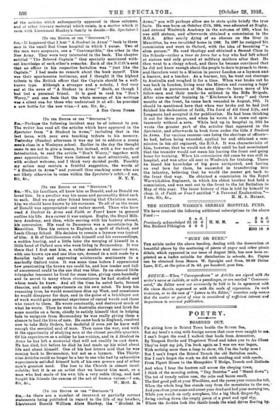[To TER EDITOR elt THI " SPECTATCR."]
Ste,—As there are a number of incorrect or partially correct statements being published in regard to the life of my brother, Lieutenant Donald William Alen Hankey, the " Student in ∎ Arms," you will perhaps allow me to state quite briefly the true 'facts. Hawes born on October 27th, 1884, wee educated at- Rugby, and entered Woolwich Academy in the autumn of 1901, when he was still sixteen, and afterwards obtained a commission in the
R.G.A. After nearly dying of an abscess on the liver in Mauritius, he was invalided home in 1906. In 1907 he resigned his commission and went to Oxford, with the idea of becoming "'a slum parson." He read theology and obtained a Second Class in the Schools—rather a tour de force for a boy who had left school at sixteen and only ground at military matters after that. He then went to a clergy school, and there be became convinced that he did not know enough about the people to dare to preach to them, and therefore went to a Mission in poorer London as a layman and 'a learner, not a teacher. As a learner, too, he went out steerage to Australia and roughed it for a time. When war broke out he was back in London, living near the Mission and running a &Aye' club, and in pursuance of the same idea—to learn more of his fellow-men and their needs—he enlisted in the Rifle Brigade. After nine months' training in " Kitchener's Army " and three months at the front, he came back wounded in August, 1915. It should be mentioned here that when war broke out he had just finished his declaration of faith, The Lord of All Good Life, and Longmans had accepted it for publication. He had been thinking it out for three years, and when he wrote it it came• out spon taneously without a note. While laid up in hospital in 1915 he wrote the greater part of the articles that appeared in the Spectator, and afterwards in book form under the title A Student in Arms. For various reasons—one being the shortage of officers— he had, before being wounded, applied for and obtained a com- mission in his all regiment, the R.G.A. It was characteristic of him, however, that he would not do this until he had ascertained that the transfer would not mean his leaving the front and going home for training. When his commission did come he was still in hospital, and was after all sent to Woolwich for training. There he found his knowledge of big guns antiquated, and having no real lore for them, he succeeded in transferring into the infantry, believing that lie would the sooner get back to the front that way. He obtained a commission in the Royal Warwickshire Regiment, in which his eldest brother had held a commission, and was sent out to the front to the lot Battalion in May of this year. The inner history of this is told by himself in chap. ii. of Faith or Fear? entitled "A Personal Explanation."—


































 Previous page
Previous page